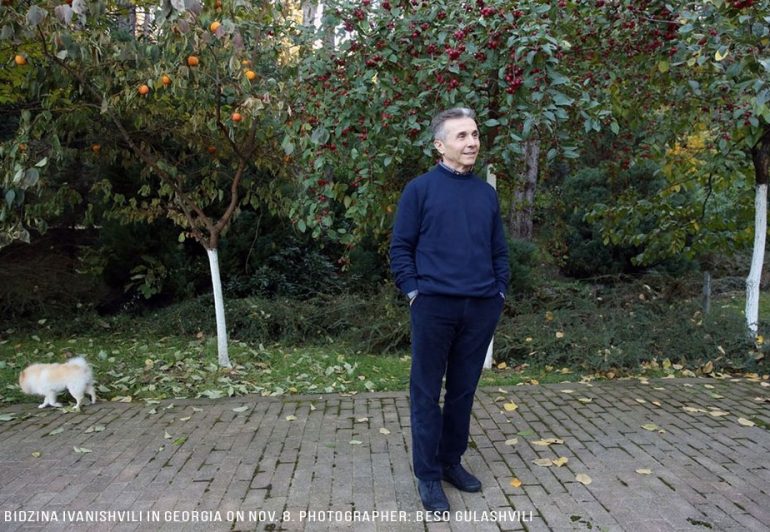A former Credit Suisse Group AG banker was not the lone wolf the firm described when he was convicted of fraud, according to his main victim, Georgian billionaire Bidzina Ivanishvili.
Armed with falsified portfolio statements, Patrice Lescaudron and at least two other colleagues made multiple trips to the former Georgian prime minister’s villa in the countryside, two hours outside the capital Tbilisi, Ivanishvili said in an interview.
It’s the first time Ivanishvili, who had at least $800 million of his $5.4 billion fortune tied up with Credit Suisse, has discussed the case in public — and his comments are at odds with the bank’s insistence that Lescaudron acted alone and kept his colleagues in the dark.
“For a few years, three people would come to me and bring fake balance statements,” Ivanishvili, 64, said sitting at a long table overlooking a koi pond and waterfall. “It’s impossible for one person to be able to do this,” and if they can “then it’s not a bank,” he said, stressing the visitors would come and sit in the same chairs around the same long wooden table.
Credit Suisse, which manages about $760 billion for wealthy clients around the world, has consistently said Lescaudron was a lone wolf who duped not only his clients but also his colleagues in a scheme to cover up trading losses with money from investors that only ended when he confessed in 2015. Lescaudron’s former boss even testified during the 2018 trial that he had no idea of his deputy’s deception. Various aspects of the trial’s verdict are under appeal.
Ivanishvili refuses to believe that the once high-flying Credit Suisse banker could have kept such an elaborate deception from his colleagues over an eight-year period. He’s suing the bank to secure the rest of the $140 million he said he lost to Lescaudron, which a Geneva court awarded in damages in 2018. He is still owed more than $100 million in unauthorized transfers, stolen funds and securities, according to his spokesman.
No Evidence
A spokeswoman for the bank declined to comment on the trips Ivanishvili cites. Geneva’s criminal court concluded that Lescaudron concealed his deceptions from his colleagues and acted alone, and recognized Credit Suisse as “the damaged party,” the bank said in a statement.
“Credit Suisse follows a zero tolerance approach regarding misconduct by its employees,” the bank said.
Lescaudron has said he never intended to hoodwink his clients but panicked when he ran into losses during the 2008 financial crisis and so began faking trade orders to divert cash from Ivanishvili’s accounts to cover those bad bets. Lescaudron was convicted in 2018 of orchestrating a scheme that resulted in damages of 143 million Swiss francs ($144 million) and was found to have gained 30 million francs through his deception.
Other clients who testified at his trial have been equally insistent that Lescaudron could not have maintained his fraud over such a long time without the help of colleagues, or at least without knowledge of the bank.
“There is a time to search for culprits and propose theories” about collusion and “a time to make legal decisions, and it’s time for the latter,” said Lescaudron’s lawyer, Simon Ntah. The prosecutor’s “examination and extensive collaboration of my client has shed much light on this dossier.”
In the interview, Ivanishvili said he could not recall in which specific years Lescaudron’s accompanied trips to Georgia took place. The Frenchman made a visit in June 2015, just months before he confessed, when he was accompanied by three fellow bankers, according to a person familiar with the investigation. However the colleagues were there to discuss a redistribution of Ivanishvili’s trusts with his spouse and at least one of them said he didn’t see Lescaudron hand his client any statements, the person said.
Ivanishvili said he’s been left disillusioned by how he’s been treated by the Swiss bank, even compared to the freewheeling ways of Russian banking in the 1990s.
He said that although he’d done business “in wild, wild Russia and in Georgian banks” he’d experienced “nothing similar to what I’ve seen at Credit Suisse.”
PhD in Economics
Ivanishvili left Georgia for Moscow to study for a PhD in economics in the early 1980s. He stayed on to make his fortune in Russia, co-founding Rossiyskiy Kredit Bank, briefly one of Russia’s biggest. Its co-founder was Vitaly Malkin, also a client of Lescaudron, who testified as a plaintiff in the 2018 trial.
“When I came to Credit Suisse,” Ivanishvili recalled, “I said to myself ‘OK, the money is home, it’s a safe place.’ I could not imagine that a bank like Credit Suisse could do something like this.”
The case shows no sign of ending soon, with the criminal verdict still under appeal, and any civil proceedings yet to begin.
The Georgian has taken his fight to Singapore, New Zealand and Bermuda where Credit Suisse had trusts or insurance units through which his money was invested, to try to force disclosure. In New York, Malkin’s lawyers last year sued in federal court to try to get Credit Suisse to hand over documents they believe would shed light on Lescaudron’s behavior.
Ivanishvili said the fight is not about the money – “I have more than I require” – but about principle. “Whatever it takes, however long it takes, I’m not going to back down.”













